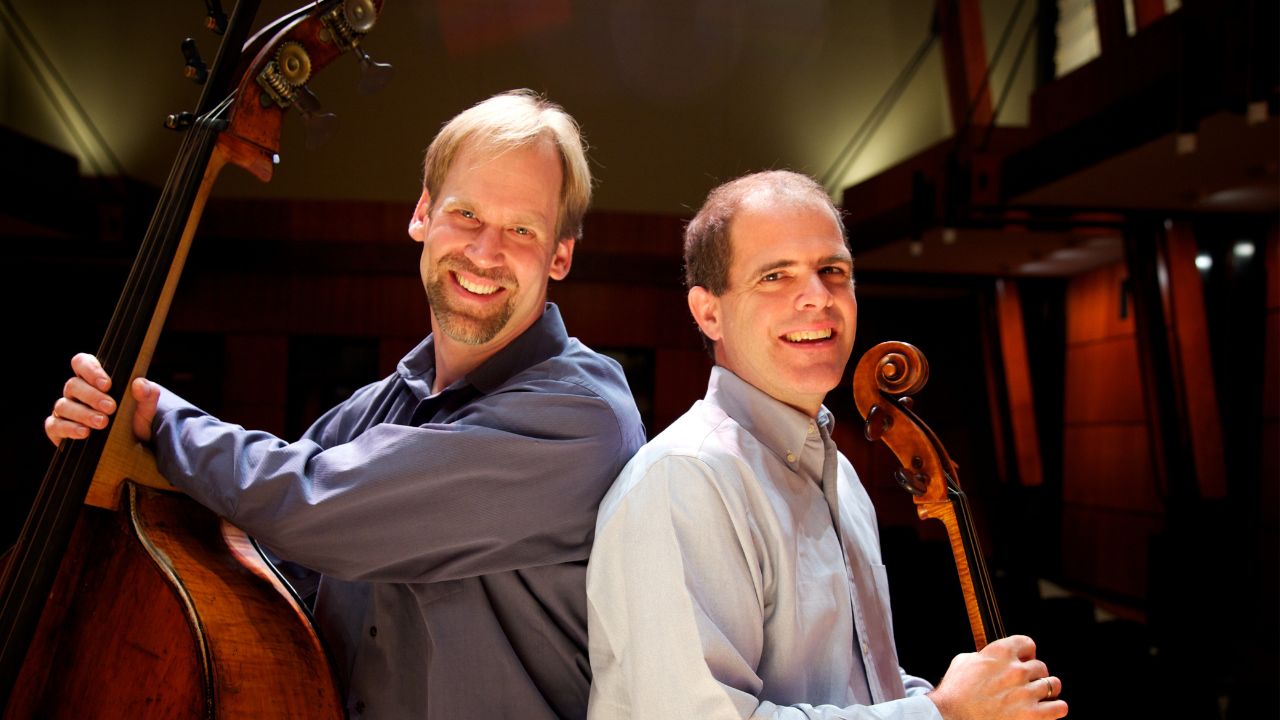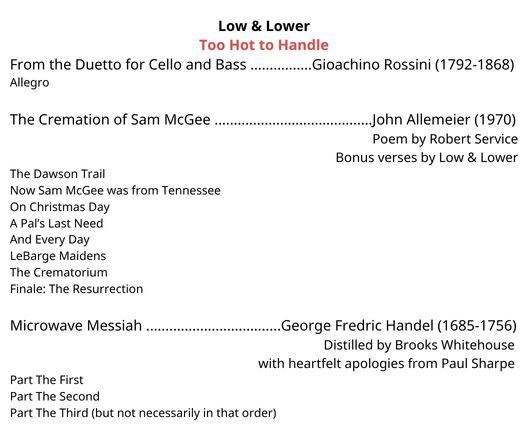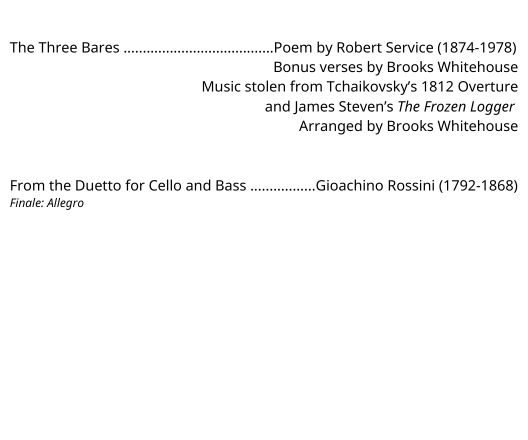
Crossroads: Low and Lower

Crossroads: Low and Lower
Featured Artists: Brooks Whitehouse, cello, and Paul Sharpe, bass
If you like stringed instruments and comedy, you cannot miss this performance. A mash-up of artistry, virtuosity, and satire, developing a completely new genre in answer to the question, “Cello and bass … seriously?” Presented in conjunction with L.A.T.E. hours at Hickory Museum of Art.
About Low and Lower:
When not in full professor mode at UNCSA, cellist Brooks Whitehouse and bassist Paul Sharpe are Low & Lower, America’s #1-selling cello bass duo – literally #1 – I mean what are the odds? This ensemble’s performances are a mash-up of artistry, virtuosity, humiliation, self-denigration and satire. With MacGyver-like determination they create, inspire, and commission works using Monopoly money, and perform them with only the limited materials at hand – a cello, a bass, two voices, (well, at least one and a half voices) an unshakeable belief that they are funny, and a day job to cover their butts.
But seriously folks, since their inception in 2010, they have traveled the country entertaining audiences with cello/bass chestnuts (both of them), brave new works, daring arrangements, vocalizing and storytelling. They have performed together as soloists with the Boise Philharmonic and the Winston-Salem Symphony, and in recital at Interlochen and the Arizona MusicFest. They have toured the East Coast, the West Coast, the Southwest, the Northeast and the great state of Alaska, and even played some concerts together in some of those regions.
They have performed live on WGBH’s Drive Time Live in Boston and WUNC’s The State of Things with Frank Stacio, The fact that Frank’s show was cancelled soon after had nothing to do with their appearance on it. Low & Lower has inspired new works by Joshua Davis, Bruce Tippette, Ching-chu Hu and John Allemeier, and a live video of Lawrence Dillon’s Poke filmed during their 2012 Alaskan tour went viral, spreading across the world from the US to Europe, Africa, South America and the Philippines. The New York Magazine called their recent AMR-Naxos recording of David Feurzeig’s Lingua Franca, “More than just funny ha-ha…theatrical, intimate, nimble, layered, refined, and shot through with startling delights.” That being said, they generally just shoot for funny ha-ha, and are perfectly fine with that.
🎟️ GET TICKETS 🎟️
PROGRAM (notes on the text below)


Poems and Text
The Cremation of Sam McGee is a setting of Robert Service’s poem of the same name. This work is a musical theater piece of sorts. Composed in collaboration with Low and Lower (Brooks Whitehouse and Paul Sharpe), this composition tells the tragic story of Sam McGee and his friend Cap as they search for gold in the Yukon Territory. Some commissions are like cooking shows where the mystery ingredients come as requests from the performers to incorporate into the piece. The mystery ingredients for The Cremation of Sam McGee consisted of a country ballad, multiple Wagnerian quotes, and references to Tennessee. While scored for cello and bass, the performers also narrate and sing this epic tale.
The Cremation of Sam McGee by Robert Service
There are strange things done in the midnight sun
By the men who moil for gold;
The Arctic trails have their secret tales
That would make your blood run cold;
The Northern Lights have seen queer sights,
But the queerest they ever did see
Was that night on the marge of Lake Lebarge
I cremated Sam McGee.
Now Sam McGee was from Tennessee, where the cotton blooms and blows.
Why he left his home in the South to roam ’round the Pole, God only knows.
He was always cold, but the land of gold seemed to hold him like a spell;
Though he’d often say in his homely way that “he’d sooner live in hell.”
On a Christmas Day we were mushing our way over the Dawson trail.
Talk of your cold! through the parka’s fold it stabbed like a driven nail.
If our eyes we’d close, then the lashes froze till sometimes we couldn’t see;
It wasn’t much fun, but the only one to whimper was Sam McGee.
And that very night, as we lay packed tight in our robes beneath the snow,
And the dogs were fed, and the stars o’erhead were dancing heel and toe,
He turned to me, and “Cap,” says he, “I’ll cash in this trip, I guess;
And if I do, I’m asking that you won’t refuse my last request.”
Well, he seemed so low that I couldn’t say no; then he says with a sort of moan:
“It’s the cursèd cold, and it’s got right hold till I’m chilled clean through to the bone.
Yet ’tain’t being dead—it’s my awful dread of the icy grave that pains;
So I want you to swear that, foul or fair, you’ll cremate my last remains.”
A pal’s last need is a thing to heed, so I swore I would not fail;
And we started on at the streak of dawn; but God! he looked ghastly pale.
He crouched on the sleigh, and he raved all day of his home in Tennessee;
And before nightfall a corpse was all that was left of Sam McGee.
There wasn’t a breath in that land of death, and I hurried, horror-driven,
With a corpse half hid that I couldn’t get rid, because of a promise given;
It was lashed to the sleigh, and it seemed to say: “You may tax your brawn and brains,
But you promised true, and it’s up to you to cremate those last remains.”
Now a promise made is a debt unpaid, and the trail has its own stern code.
In the days to come, though my lips were dumb, in my heart how I cursed that load.
In the long, long night, by the lone firelight, while the huskies, round in a ring,
Howled out their woes to the homeless snows— O God! how I loathed the thing.
And every day that quiet clay seemed to heavy and heavier grow;
And on I went, though the dogs were spent and the grub was getting low;
The trail was bad, and I felt half mad, but I swore I would not give in;
And I’d often sing to the hateful thing, and it hearkened with a grin.
Till I came to the marge of Lake Lebarge, and a derelict there lay;
It was jammed in the ice, but I saw in a trice it was called the “Alice May.”
And I looked at it, and I thought a bit, and I looked at my frozen chum;
Then “Here,” said I, with a sudden cry, “is my cre-ma-tor-eum.”
Additional text and Low and Lower Special Song: Lebarge Maidens We!
The cremation I planned was now well in hand
And it lifted my spirits so,
When out of the lake, with its icy cake
Two Nymphs rose all aglow!
Rhine Maidens they were, and that is for sure,
Straight out of Herr Wagner’s The Ring.
Why these maidens at large had moved to LeBarge,
We may never know, that’s the thing.
In Alaska now stranded, it seemed they’d rebranded.
Their river gowns now were just trade-ins.
In fur, these old farts were now topping the charts
As the fabled Lebarge Maidens.
Lebarge maidens we – we used to be three
‘Till Flosshilde she froze her ass off.
So now we are two and we’ll have to make due,
As women we try to pass off.
Rhine maidens of old
We’re all about gold!
Gold rings were our specialty – previously!
We now like the nugget.
Were it beer, we would chug it.
From prospectors, we hide it – deviously!
The Arctic is fine, though we do miss the Rhine.
The move here, we found it quite taxing.
Flosshilde, she bought it – pneumonia she caught it..
We’re managing, thank you for asking!
We now guard this lake.
A real piece of cake.
Right here on this lonely cold isthmus.
No tourists to speak of –
Especially the weeks around Christmas.
Its your lucky day here chez Alice May.
We welcome the both of you fellows.
Your need for cremation is our celebration,
And look what we brought you…MARSHMALLOWS!
Now back to our story:
Some planks I tore from the cabin floor, and I lit the boiler fire;
Some coal I found that was lying around, and I heaped the fuel higher;
The flames just soared, and the furnace roared—such a blaze you seldom see;
And I burrowed a hole in the glowing coal, and I stuffed in Sam McGee.
Then I made a hike, for I didn’t like to hear him sizzle so;
And the heavens scowled, and the huskies howled, and the wind began to blow.
It was icy cold, but the hot sweat rolled down my cheeks, and I don’t know why;
And the greasy smoke in an inky cloak went streaking down the sky.
I do not know how long in the snow I wrestled with grisly fear;
But the stars came out and they danced about ere again I ventured near;
I was sick with dread, but I bravely said: “I’ll just take a peep inside.
I guess he’s cooked, and it’s time I looked”; … then the door I opened wide.
And there sat Sam, looking cool and calm, in the heart of the furnace roar;
And he wore a smile you could see a mile, and he said: “Please close that door.
It’s fine in here, but I greatly fear you’ll let in the cold and storm—
Since I left Plumtree, down in Tennessee, it’s the first time I’ve been warm.”
There are strange things done in the midnight sun
By the men who moil for gold;
The Arctic trails have their secret tales
That would make your blood run cold;
The Northern Lights have seen queer sights,
But the queerest they ever did see
Was that night on the marge of Lake Lebarge
I cremated Sam McGee.
Three Bares by Robert Service
Ma tried to wash her garden slacks but couldn’t get ’em clean
And so she thought she’d soak ’em in a bucket o’ benzine.
It worked all right. She wrung ’em out then wondered what she’d do
With all that bucket load of high explosive residue.
She knew that it was dangerous to scatter it around,
For Grandpa liked to throw his lighted matches on the ground.
Somehow she didn’t dare to pour it down the kitchen sink,
And what the heck to do with it, poor Ma jest couldn’t think.
Then Nature seemed to give the clue, as down the garden lot
She spied the edifice that graced a solitary spot,
Their Palace of Necessity, the family joy and pride,
Enshrined in morning-glory vine, with graded seats inside;
Jest like that cabin Goldylocks found occupied by three,
But in this case B-E-A-R was spelt B-A-R-E—-
A tiny seat for Baby Bare, a medium for Ma,
A full-sized section sacred to the Bare of Grandpapa.
Well, Ma was mighty glad to get that worry off her mind,
And hefting up the bucket so combustibly inclined,
She hurried down the garden to that refuge so discreet,
And dumped the liquid menace safely through the centre seat.
Next morning old Grandpa arose; he made a hearty meal,
And sniffed the air and said: `By Gosh! how full of beans I feel.
Darned if I ain’t as fresh as paint; my joy will be complete
With jest a quiet session on the usual morning seat;
To smoke me pipe an’ meditate, an’ maybe write a pome,
For that’s the time when bits o’ rhyme gits jiggin’ in me dome.’
Low & Lower Special Song: What Is A Movement?
What is a movement?
That depends on what you do.
As I sit in contemplation here
I share my thoughts with you.
To musicians, why a movement
Is an independent part
Of a larger composition
With an ending and a start.
To a dancer, why a movement
Is a gesture, leap or flip,
With a motion softly flowing
From the head to toe to hip.
To politicians, movements
Are the way you get elected,
With grass roots plans and online scams
And slogans all perfected.
What a movement means to me right now
Might come across as crass.
So let’s just say this movement,
Like all things in life, will pass!
Now back to our story….
He sat down on that special seat slicked shiny by his age,
And looking like Walt Whitman, jest a silver-whiskered sage,
He filled his corn-cob to the brim and tapped it snugly down,
And chuckled: `Of a perfect day I reckon this the crown.’
He lit the weed, it soothed his need, it was so soft and sweet:
And then he dropped the lighted match clean through the middle seat.
His little grand-child Rosyleen cried from the kichen door:
Oh, Ma, come quick; there’s sompin wrong; I heared a dreffel roar;
Oh, Ma, I see a sheet of flame; it’s rising high and higher…
Oh, Mummy dear, I sadly fear our comfort-cot’s caught fire.’
Poor Ma was thrilled with horror at them words o’ Rosyleen.
She thought of Grandpa’s matches and that bucket of benzine;
So down the garden geared on high, she ran with all her power,
For regular was Grandpa, and she knew it was his hour.
Then graspin’ gaspin’ Rosyleen she peered into the fire,
A roarin’ soarin’ furnace now, perchance old Grandpa’s pyre….
But as them twain expressed their pain they heard a hearty cheer—-
Behold the old rapscallion squattinn’ in the duck pond near,
His silver whiskers singed away, a gosh-almighty wreck,
W i’ half a yard o’ toilet seat entwined about his neck….
He cried: `Say, folks, oh, did ye hear the big blow-out I made?
It scared me stiff – I hope you-uns was not too much afraid?
But now I best be crawlin’ out o’ this dog-gasted wet….
For what I aim to figger out is—-WHAT THE HECK I ET?’
